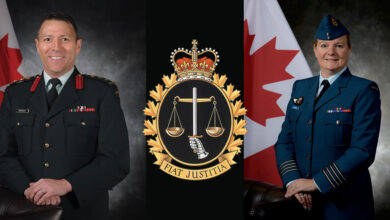Duty CallsUncategorized
New Anti-Terrorism Legislation Coming
A roundtable discussion how best to protect Canadians from the evolving threats of terrorism and extremism took place on January 29.
The meeting came as a response to the international jihadist movement declaring war on Canada, on Canadian allies, and on the sacred values and way of life of Canadians.
“That’s why our Government committed the Canadian Armed Forces to the broad international coalition against the so-called Islamic State. Canada will not stand on the side-lines while our allies act to deny terrorists a safe haven – an international base – from which they would plot violence against us,” said Prime Minister Stephen Harper.
For the discussions Prime Minister Harper was joined by Julian Fantino, associate minister of national defence, Lois Brown, parliamentary secretary to the minister of international development and Member of Parliament for Newmarket-Aurora, Roxanne James, parliamentary secretary to the minister of public safety and emergency preparedness, as well as York, Durham, Peel and Hamilton Chiefs of Police.
Law enforcement officials briefed Prime Minister Harper on the various tools authorities need to prevent and investigate terrorist acts, deal with them when they occur, and ensure that laws are in place to punish the violent criminals who engage in such crimes.
Following the attacks of September 11, 2001, Canada’s Anti-terrorism Act formed a key component of the Government’s Anti-terrorism Plan.
The four objectives of the plan are to prevent terrorists from getting into Canada and protect Canadians from terrorist acts; to bring forward tools to identify, prosecute, convict and punish terrorists;
to keep the Canada-U.S. border secure and a contributor to economic security; and to work with the international community to bring terrorists to justice and address the root causes of violence.
“I welcomed the opportunity today to participate in this important roundtable to discuss how we can prevent terrorism in Canada and neutralize terrorist cells, while ensuring that the rights and freedoms of law-abiding Canadians are respected. There is work to be done here at home as well,” said Prime Minister Harper.
Canada’s first counter-terrorism strategy, Building Resilience Against Terrorism, was released in 2012. This comprehensive strategy guides more than 20 federal departments and agencies to better align them to prevent and detect terrorism, deny terrorists the means and opportunities to pursue terrorist activities, and respond to threats when they occur.
On January 30 Prime Minister Harper, on behalf of the members of the roundtable, will put legislation before Parliament that will help authorities stop planned attacks, get threats off our streets, criminalize the promotion of terrorism, and prevent terrorists from travelling abroad and recruiting others.
Over the years, the Government of Canada has passed additional legislation such as the Combating Terrorism Act and the Strengthening Canadian Citizenship Act to better protect Canadians and secure institutions.
Nevertheless, last October’s attacks in Ottawa and Saint-Jean-sur-Richelieu demonstrated that Canada is not immune to the evolving and increasingly diffuse threat of terrorism, which is why the government is continuing to take necessary steps to keep Canadians safe.









